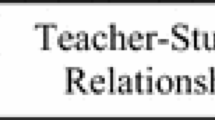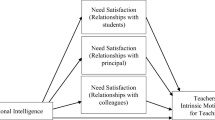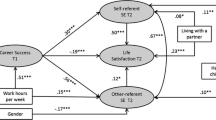Abstract
The central aim of the study was to examine the relationship between primary school teachers’ life goals and life satisfaction using the self-determination theory (Deci and Ryan 2000) and the flow theory (Csikszentmihalyi 1975) as a framework. A study was conducted to test whether the relationship between intrinsic life goals and teachers’ life satisfaction is mediated by two serially posited mediators, the satisfaction of each basic psychological need (competence, autonomy and relatedness) and the experience of flow at work. A total of 480 primary school teachers (17 years of work experience on average) from different regions of Croatia participated in the study. The results, obtained by structural equation modeling, showed that only the need for competence and flow at work significantly mediate between intrinsic life goals and life satisfaction (β = .04, p < .001). The needs for autonomy and relatedness were not significant mediators when used as serial mediators. Thus, the study provides evidence that the positive relationship between life goals and life satisfaction is partly due to the increased satisfaction of the need for competence and more frequent flow experience at work. Also, the indirect effect of extrinsic goals on life satisfaction (β = −.024, p < .01) through autonomy and flow work was tested and found to be significant.

Similar content being viewed by others
Change history
19 June 2017
An erratum has been published.
References
Arbuckle, J. L. (2011). Amos 20 user’s guide. Chicago: IBM/SPSS.
Asakawa, K. (2004). Flow experience and autotelic personality in Japanese college students: How do they experience challenges in daily life? Journal of Happiness Studies, 5(2), 123–154. doi:10.1023/B:JOHS.0000035915.97836.89.
Asakawa, K. (2010). Flow experience, culture, and well-being: How do autotelic Japanese college student feel, behave, and think in their daily lives? Journal of Happiness Studies, 11, 205–223. doi:10.1007/s10902-008-9132-3.
Asakawa, K., & Nakamura, J. (2008, July). The study of autotelic personality. In Paper presented at the 4th European conference on positive psychology. Rijeka: Croatia.
Baard, P. P., Deci, E. L., & Ryan, R. M. (2004). Intrinsic need satisfaction: A motivational basis of performance and well-being in two work settings. Journal of Applied Social Psychology, 34(10), 2045–2068. doi:10.1111/j.1559-1816.2004.tb02690.x.
Bakker, A. B. (2008). The work-related flow inventory: Construction and initial validation of the WOLF. Journal of Vocational Behavior, 72, 400–414. doi:10.1016/j.jvb.2007.11.007.
Bandura, A. (1977). Self-efficacy: Toward a unifying theory of behavioral change. Psychological Review, 84(2), 191–215. doi:10.1037/0033-295X.84.2.191.
Bassi, M., & Delle Fave, A. (2012). Optimal experience and self-determination at school: Joining perspectives. Motivation and Emotion, 36(4), 425–438. doi:10.1007/s11031-011-9268-z.
Brdar, I. (2006). Životni ciljevi i dobrobit: Je li za sreću važno što želimo? Društvena istraživanja, 84-85, 671–691.
Briner, R. B., & Dewberry, C. (2007). Staff well-being is key to school success: A research study into the links between staff well-being and school performance. Worklife support. http://worklifesupport.com/sites/default/files/uploaded-documents/5902BirkbeckWBPerfSummaryFinal.pdf.
Bryce, J., & Haworth, J. (2002). Wellbeing and flow in sample of male and female office workers. Leisure Studies, 21(3–4), 249–263. doi:10.1080/0261436021000030687.
Bulmer, M. G. (1979). Principles of statistics. Mineola: Courier Dover Publications.
Csikszentmihalyi, M. (1975). Beyond boredom and anxiety. San Francisco: Jossey-Bass.
Csikszentmihalyi, M. (1990). Flow: The psychology of optimal experience. New York: Harper and Row.
Csikszentmihalyi, M., & Csikszentmihalyi, I. (1988). Optimal experience: Psychological studies of flow in consciousness. Cambridge: Cambridge University Press.
Csikszentmihalyi, M., & Hunter, J. (2003). Happiness in everyday life: The uses of experience sampling. Journal of Happiness Studies, 4(2), 185–199. doi:10.1023/A:1024409732742.
Csikszentmihalyi, M., & LeFevre, J. (1989). Optimal experience in work and leisure. Journal of Personality and Social Psychology, 56, 815–822. doi:10.1037/0022-3514.56.5.815.
Csikszentmihalyi, M., Abuhamdeh, S., & Nakamura, J. (2005). Flow. In A. Elliot (Ed.), Handbook of competence and motivation (pp. 598–698). New York: The Guilford Press.
Deci, E. L., & Ryan, R. M. (1985). Intrinsic motivation and self-determination in human behavior. New York: Plenum.
Deci, E. L., & Ryan, R. M. (1991). A motivational approach to self: Integration in personality. In R. Dienstbier (Ed.), Nebraska symposium on motivation, Perspectives on motivation (Vol. 38, pp. 237–288). Lincoln: University of Nebraska Press.
Deci, E. L., & Ryan, R. M. (2000). The 'what' and 'why' of goal pursuits: Human needs and the self-determination of behavior. Psychological Inquiry, 11, 227–268. doi:10.1207/S15327965PLI1104_01.
Deci, E. L., Koestner, R., & Ryan, R. M. (1999). A meta-analytic review of experiments examining the effects of extrinsic rewards on intrinsic motivation. Psychological Bulletin, 125, 627–668. doi:10.1037/0033-2909.125.6.627.
Delle Fave, A. (2007). Ottimizzare l’esperienza di docenti e studenti. Teorie, ricerche, proposte [optimizing the experience of teachers and students. Theories, research, proposals]. In C. Cosimo & G. Vernì (Eds.), Scuola attraente e cultural del benessere. La scuola che promuove salute (pp. 27–70). Ufficio Scolastico Regionale Puglia: Bari.
Delle Fave, A., & Massimini, F. (2003). Optimal experience in work and leisure among teachers and physicians: Individual and bio-cultural implications. Leisure Studies, 22, 323–342. doi:10.1080/02614360310001594122.
Diener, E., & Diener, M. (1995). Cross-cultural correlates of life satisfaction and self-esteem. Journal of Personality and Social Psychology, 68(4), 653–663. doi:10.1037/0022-3514.68.4.653.
Diener, E., & Scollon, C. (2003, October). Subjective well-being is desirable, but not the summum bonum. Paper presented at the University of Minnesota Interdisciplinary Workshop on Well-Being in Minneapolis, USA.
Diener, E., Emmons, R. A., Larsen, R. J., & Griffin, S. (1985). The satisfaction with life scale. Journal of Personality Assessment, 49, 71–75. doi:10.1207/s15327752jpa4901_13.
Duckworth, A. L., Quinn, P. D., & Seligman, M. E. P. (2009). Positive predictors of teacher effectiveness. The Journal of Positive Psychology, 19, 540–547. doi:10.1080/17439760903157232.
Ebbeck, V., & Weiss, M. R. (1998). Determinants of children’s self-esteem: An examination of perceived competence and affect in sport. Pediatric Exercise Science, 10, 285–298. doi:10.1123/pes.10.3.285.
Fong, C. J., Zaleski, D. J., & Leach, J. K. (2015). The challenge-skill balance and antecedents of flow: A meta-analytic investigation. The Journal of Positive Psychology, 10(5), 425–446. doi:10.1080/17439760.2014.967799.
Fromm, E. (1976). Fromm: To have or to be? New York: Continuum.
Grouzet, F., Kasser, T., Ahuvia, A., Dols, J., Kim, Y., Lau, S., et al. (2005). The structure of goal contents across 15 cultures. Journal of Personality and Social Psychology, 89(5), 800–816. doi:10.1037/0022-3514.89.5.800.
Hair, J., Black, W. C., Babin, B. J., & Anderson, R. E. (2010). Multivariate data analysis (7th Ed.). Upper saddle river, New Jersey: Pearson education international.
Han, S. (1988). The relationship between life satisfaction and flow in elderly Korean immigrants. In M. Csikszentmihalyi & I. S. Csikszentmihalyi (Eds.), Optimal experience: Psychological studies of flow in consciousness (pp. 138–149). New York: Cambridge University Press.
Hodge, K., Lonsdale, C., & Jackson, S. A. (2009). Athlete engagement in elite sport: An exploratory investigation of antecedents and consequences. The Sport Psychologist, 23, 186–202. doi:10.1123/tsp.23.2.186.
Hu, L., & Bentler, P. M. (1999). Cutoff criteria for fit indexes in covariance structure analysis: Conventional criteria versus new alternatives. Structural Equation Modeling, 6(1), 1–55. doi:10.1080/10705519909540118.
Ilardi, B. C., Leone, D., Kasser, R., & Ryan, R. M. (1993). Employee and supervisor ratings of motivation: Main effects and discrepancies associated with job satisfaction and adjustment in a factory setting. Journal of Applied Social Psychology, 23, 1789–1805. doi:10.1111/j.1559-1816.1993.tb01066.x.
Ishimura, I., & Kodama, M. (2006). Dimensions of flow experience in Japanese college students: Relation between flow experience and mental health. Japanese Journal of Health Psychology, 13, 23–34.
Jang, H., Reeve, J., Ryan, R. M., & Kim, A. (2009). Can self-determination theory explain what underlies the productive, satisfying learning experiences of collectivistically oriented Korean students? Journal of Educational Psychology, 101, 644–661. doi:10.1037/a0014241.
Jurčec, L., & Rijavec, M. (2015). Work orientations and well/ill-being of elementary school teachers. In M. Matijević & S. Opić (Eds.), Nastava i škola za net generacije: unutarnja reforma nastave u osnovnoj i srednjoj školi (str. 100–110). Zagreb: Faculty of Teacher Education, University of Zagreb.
Kasser, T., & Ahuvia, A. C. (2002). Materialistic values and well-being in business students. European Journal of Social Psychology, 32, 137–146. doi:10.1002/ejsp.85.
Kasser, T., & Ryan, R. M. (1993). A dark side of the American dream: Correlates of financial success as a central life aspiration. Journal of Personality and Social Psychology, 65, 410–422. doi:10.1037/0022-3514.65.2.410.
Kasser, T., & Ryan, R. M. (1996). Further examining the American dream: Well-being correlates of intrinsic and extrinsic goals. Personality and Social Psychology Bulletin, 22, 281–288. doi:10.1177/0146167296223006.
Kasser, V. G., & Ryan, R. M. (1999). The relation of psychological needs for autonomy and relatedness to vitality, well-being, and mortality in a nursing home. Journal of Applied Social Psychology, 29(5), 935–954. doi:10.1111/j.1559-1816.1999.tb00133.x.
Kim, Y., Kasser, T., & Lee, H. (2003). Self-concept, aspirations, and well-being in South Korea and the United States. Journal of Social Psychology, 143, 277–290. doi:10.1080/00224540309598445.
Klassen, R. M., Perry, N. E., & Frenzel, A. C. (2012). Teachers' relatedness with students: An underemphasized component of teachers' basic psychological needs. Journal of Educational Psychology, 104(1), 150–165. doi:10.1037/a0026253.
Kline, R. B. (2015). Principles and practices of structural equation modeling (4th ed.). New York: Guilford.
Kowal, J., & Fortier, M. S. (1999). Motivational determinants of flow: Contributions from self–determination theory. Journal of Social Psychology, 139, 355–368. doi:10.1080/00224549909598391.
Kowal, J., & Fortier, M. S. (2000). Testing relationships from the hierarchical model of intrinsic and extrinsic motivation using flow as motivational consequence. Research Quarterly for Exercise and Sport, 71(2), 171–181. doi:10.1080/02701367.2000.10608895.
Kuzucu, Y., & Şimşek, Ö. F. (2013). Self-determined choices and consequences: The relationship between basic psychological needs satisfactions and aggression in late adolescents. The Journal of General Psychology, 140(2), 110–129. doi:10.1080/00221309.2013.771607.
La Guardia, J. G., Ryan, R. M., Couchman, C. E., & Deci, E. L. (2000). Within-person variation in security of attachment: A self-determination theory perspective on attachment, need fulfillment, and well-being. Journal of Personality and Social Psychology, 79, 367–384. doi:10.1037/0022-3514.79.3.367.
Lyubomirsky, S., King, L. A., & Diener, E. (2005). The benefits of frequent positive affect. Psychological Bulletin, 131, 803–855. doi:10.1037/0033-2909.131.6.803.
Mannell, R. C., Zuzanek, J., & Larson, R. (1988). Leisure states and "flow" experiences: Testing perceived freedom and intrinsic motivation hypotheses. Journal of Leisure Research, 20(4), 289–304.
Massimini, F., & Carli, M. (1988). The systematic assessment of flow in daily experience. In M. Csikszentmihalyi & I. Csikszentmihalyi (Eds.), Optimal experience: Psychological studies of flow in consciousness (pp. 266–287). New York: Cambridge University Press.
Merkaš, M., Raboteg-Šarić, Z., & Miljković, D. (2011). The relation of intrinsic and extrinsic aspirations to adolescent life satisfaction. In I. Brdar (Ed.), The human pursuit of well-being: A cultural approach (pp. 107–119). New York: Springer.
Milyavskaya, M., & Koestner, R. (2011). Psychological needs, motivation, and well-being: A test of self-determination theory across multiple domains. Personality and Individual Differences, 50, 387–391. doi:10.1016/j.paid.2010.10.029.
Moreno, J. A., Cervello, E., & Gonzalez-Cutre, D. (2010). The achievement goal and self-determination theories as predictors of dispositional flow in young athletes. Anales de Psicologia, 26(2), 390–399.
Nakamura, J., & Csikszentmihalyi, M. (2002). The concept of flow. In C. R. Snyder & S. J. Lopez (Eds.), Handbook of positive psychology (pp. 89–105). New York: Oxford University Press.
Niemiec, C. P., Ryan, R. M., & Deci, E. L. (2009). The path taken: Consequences of attaining intrinsic and extrinsic aspirations in post-college life. Journal of Research in Personality, 43, 291–306. doi:10.1016/j.jrp.2008.09.001.
Ostroff, C. (1992). The relationship between satisfaction, attitudes, and performance: An organizational level analysis. Journal of Applied Psychology, 77(6), 963–974. doi:10.1037/0021-9010.77.6.963.
Pavot, W., & Diener, E. (2008). The satisfaction with life scale and the emerging construct of life satisfaction. The Journal of Positive Psychology, 3, 137–152. doi:10.1080/17439760701756946.
Rijavec, M., Brdar, I., & Miljković, D. (2006). Extrinsic vs. intrinsic life goals, psychological needs and life satisfaction. In A. Delle Fave (Ed.), Dimensions of well-being: Research and intervention (pp. 91–103). Milano: Franco Angeli.
Rijavec, M., Brdar, I., & Miljković, D. (2011). Aspirations and well-being: Extrinsic vs. intrinsic life goals. Društvena istraživanja, 20(3), 693–710. doi:10.5559/di.20.3.05.
Rijavec, M., Ljubin Golub, T., & Olčar, D. (2016). Can learning for exams make students happy? Faculty related and faculty unrelated flow experiences and well-being. Croatian Journal of Education, 18(1), 153–164. doi:10.15516/cje.v18i0.2223.
Ryan, R. M. (1995). Psychological needs and the facilitation of integrative processes. Journal of Personality, 63(3), 397–427. doi:10.1111/j.1467-6494.1995.tb00501.x.
Ryan, R. M., & Deci, E. L. (2000). Self-determination theory and the facilitation of intrinsic motivation, social development, and well-being. American Psychologist, 55, 68–78. doi:10.1037/0003-066X.55.1.68.
Ryan, R. M., & Deci, E. L. (2002). An overview of self-determination theory. In E. L. Deci & R. M. Ryan (Eds.), Handbook of self-determination research (pp. 3–33). Rochester: University of Rochester Press.
Ryan, R. M., Sheldon, K. M., Kasser, T., & Deci, E. L. (1996). All goals are not created equal: An organismic perspective on the nature of goals and their regulation. In P. M. Gollwitzer & J. A. Bargh (Eds.), The psychology of action: Linking cognition and motivation to behavior (pp. 7–26). New York: Guilford Press.
Ryan, R. M., Chirkov, V. I., Little, T. D., Sheldon, K. M., Timoshina, E., & Deci, E. L. (1999). The American dream in Russia: Extrinsic aspirations and well-being in two cultures. Personality and Social Psychology Bulletin, 25, 1509–1524. doi:10.1177/01461672992510007.
Ryan, R. M., Deci, E. L., Grolnick, W. S., & La Guardia, J. G. (2006). The significance of autonomy and autonomy support in psychological development and psychopathology. In D. Cicchetti & D. J. Cohen (Eds.), Developmental psychopathology: Theory and method (Vol 1., pp. 795–849). New Jersey: John Wiley & Sons, Inc..
Schiefele, U., & Raabe, A. (2011). Skills-demands compatibility as a determinant of flow experience in an inductive reasoning task. Psychological Reports, 209(2), 428–444. doi:10.2466/04.22.PR0.109.5.428-444.
Schmuck, P., Kasser, T., & Ryan, R. M. (2000). Intrinsic and extrinsic goals: Their structure and relationship to well-being in German and U.S. college students. Social Indicators Research, 50, 225–241. doi:10.1023/A:1007084005278.
Seligman, M. E. P. (2006). Learned optimism. How to change your mind and your life. New York: Vintage books.
Sheldon, K. M., & Kasser, T. (1998). Pursuing personal goals: Skills enable progress, but not all progress is beneficial. Personality and Social Psychology Bulletin, 24(12), 1319–1331. doi:10.1177/01461672982412006.
Smolej Fritz, B., & Avsec, A. (2007). The experience of flow and subjective well-being of music students. Psihološka obzorja, 16(2), 5–17.
Standage, M., & Gillison, F. (2007). Students’ motivational responses toward school physical education and their relationship to general self-esteem and health-related quality of life. Psychology of Sport and Exercise, 8, 704–721. doi:10.1016/j.psychsport.2006.12.004.
Tong, E. M. W., Bishop, G. D., Enkelmann, H. C., Diong, S. M., Why, Y. P., et al. (2009). Emotion and appraisal profiles of the needs for competence and relatedness. Basic and Applied Social Psychology, 31, 218–225. doi:10.1080/01973530903058326.
Van den Broeck, A., Vansteenkiste, M., De Witte, H., Soenens, B., & Lens, W. (2010). Capturing autonomy, competence, and relatedness at work: Construction and initial validation of the work-related basic need satisfaction scale. Journal of Occupational and Organizational Psychology, 83, 981–1002. doi:10.1348/096317909X481382.
Vansteenkiste, M., Lens, W., Soenens, B., & Luyckx, K. (2006). Autonomy and relatedness among Chinese sojourners and applicants: Conflictual or independent predictors of well-being and adjustment? Motivation and Emotion, 30, 273–282. doi:10.1007/s11031-006-9041-x.
Vansteenkiste, M., Neyrinck, B., Niemiec, C. P., Soenens, B., De Witte, H., & Van den Broeck, A. (2007). On the relations among work value orientations, psychological need satisfaction, and job outcomes: A self-determination theory approach. Journal of Occupational and Organizational Psychology, 80, 251–277. doi:10.1348/096317906X111024.
Walker, C. J. (2010). Experiencing flow: Is doing it together better than doing it alone? The Journal of Positive Psychology, 5(1), 5–11. doi:10.1080/17439760903271116.
Wheaton, B., Muthen, B., Alwin, D. F., & Summers, G. (1977). Assessing reliability and stability in panel models. Sociological Methodology, 8(1), 84–136. doi:10.2307/270754.
Williams, G. C., Niemiec, C. P., Patrick, H., Ryan, R. M., & Deci, E. L. (2009). The importance of supporting autonomy and perceived competence in facilitating long-term tobacco abstinence. Annals of Behavioral Medicine, 37, 315–324. doi:10.1007/s12160-009-9090-y.
Author information
Authors and Affiliations
Corresponding author
Ethics declarations
Funding
This work received no grants or assistance from a funding body.
Ethical Approval
All procedures performed were in accordance with the ethical standards of the institutional and/or national research committee and with the 1964 Helsinki declaration and its later amendments or comparable ethical standards.
Informed Consent
Informed consent was obtained from all individual participants included in the study.
Conflict of Interest
All of the authors declare that they have no conflicts of interest.
Additional information
The original version of this article was revised: The name of the last author, Tajana Ljubin Golub, was incorrectly captured with two given names (Tajana Ljubin) and one family name (Golub). The correct name of the author should have one given name (Tajana) and two family names (Ljubin Golub).
Rights and permissions
About this article
Cite this article
Olčar, D., Rijavec, M. & Ljubin Golub, T. Primary School Teachers’ Life Satisfaction: The Role of Life Goals, Basic Psychological Needs and Flow at Work. Curr Psychol 38, 320–329 (2019). https://doi.org/10.1007/s12144-017-9611-y
Published:
Issue Date:
DOI: https://doi.org/10.1007/s12144-017-9611-y




